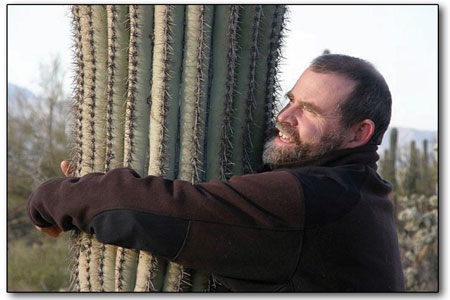

Craig Childs takes tree hugging to new extremes as he wraps his arms around a giant cactus. The noted author will be in town this week for a talk and booksigning. He will also address the sold-out La Plata County Dems Jefferson-Jackson dinner./Courtesy photo
Middle ground
Environmental author seeks to appeal to all shades of political spectrum
by Ted Holteen
When I was asked to preview author Craig Childs’ visit to Durango this week, I must confess that I hesitated before consenting to do so.
It’s not that I have anything against Childs – quite the opposite is true, actually. I find him to be a brutally honest, intelligent and dedicated individual whose last book, 2012’s Apocalyptic Planet, was his 11th in a 20-year career. His topics explore animals, archaeology, water issues and the environment, much of it centered on the American West. But his is a decidedly global perspective as well. So, one might ask, what’s my problem?
Meet Craig ChildsWhat: Q&A and booksigning with Craig Childs |
My issue with this assignment is that Childs is coming to Durango as the keynote speaker for the annual Jefferson-Jackson Dinner, which is the La Plata County Democrats’ biggest event on the fundraising calendar. Aside from the fact that both presidents for whom the event is named owned more than 100 slaves each, I choose to distance myself from partisan politics in America today. Fortunately, several factors allowed me to rationalize this missive. For one, Childs’ message is just too important to be the intellectual property of any one political faction – his issues are human issues, not political. Secondly, Childs himself is a nonpartisan, independent author and speaker.
“I’m not a member of a party,” he said. “This is the opportunity to tell a story, and it’s not affiliated with any political party. It’s a good cause. I believe in a lot of what (Democrats) do but in this case they’re just the audience for that day.”
Finally, I was happy to learn that the J-J Dinner is sold out, so there can be no perception that this article is posited to help sell tickets to a political event. What’s better is that Childs will appear earlier in the day for free at the Rochester Hotel for a Q&A session, which will allow the public to meet the man and learn what he’s got to say. And he’s got a lot to say.
Locals got a taste of Childs as a speaker in 2013 when he visited the Durango Arts Center during his publicity tour for Apocalyptic Planet. The book is a scientific assessment of the not-too-rosy future of planet Earth, which Childs believes is in the process of doing away with the human race. (That in itself is not a doomsday scenario; be it the dinosaurs or the dodo, the Earth just cycles through various life forms on its own schedule.) What Childs finds troubling, however, is that we humans are accelerating the inevitable and in fact seem to be speeding toward our undoing with Roaring ’20s-like ignorant bliss. Even so, he acknowledges that many are trying to do something about
it, and he’s certainly not going to stop trying, either.
“I come away with a lot of hope that while we’re driving environmental systems to their breaking point they’re also being driven in the opposite direction,” Childs said. “There are people working to protect our landscapes, species and biodiversity, and when I see their work I think ‘it could be a hell of a lot worse.’ We’re showing surprising restraint for the species we are.”
For this visit, which isn’t too far from Childs’ new hometown near Norwood, he’ll talk about a particular chapter from Planet that he thinks should strike a chord among locals. He’ll discuss his 2007 first descent down the Upper Salween River in Tibet, one of the few undammed rivers in that part of the world and at that altitude. His group was the first ever to navigate the torrent, which is a remarkable feat on its own. “This was a lot like the Grand Canyon with big hydraulics, but you didn’t know what was ahead,” Childs said. “The trip took us a month in total, but it was flooding, so it was going much faster than we thought. It was supposed to be two weeks on the water and it took us six days.”
Free-flowing rivers are a pet project for Childs, and he sees many parallels in the American Southwest where dammed rivers have altered local and regional ecosystems.
 The author in his home office. Childs recently relocated to near Norwood, where he is “furiously” working on his next book about the first inhabitants of North America./Courtesy photo |
“It really changes the landscape and how sediment moves,” he said. “An undammed river is part of a global circulatory system, and closing off major arteries really changes how things work. Even on a tectonic level, there’s a notable difference in how the continent’s weight is distributed with sediment and water backed up ... instead of going to a delta near a sea, it stays up at the headwaters and the weight of the water itself changes how faults work, and earthquakes, and volcanism. It’s not a small thing we’re messing with.”
He said although dams may have seemed like a good idea at the time they were built, they only offer a false sense of security. “We think in 50-year time frames, but we need to think in hundreds of thousands and millions of years.”
Childs also believes the same broad perspective can also apply to human relations, no matter what the political persuasion. His eyes were opened to this during his journey to Tibet, where one of this closest friends on the journey was a “Texas Republican,” as Childs called him. “I was the wild-eyed hippie, and he was the conservative Republican but we found much in common,” Childs said, “a love of the landscape, the attraction to the place itself and the wildness of it and there are some fundamentally similar interests about our place in the natural world. I guess to be fair, if it played out I would look more like a Democrat than a Republican but feel like the world is bigger than that and our stories transcend those boundaries.”
For that reason, Childs said he would be just as happy to speak in front of the Republicans as the Democrats, which quite frankly is a refreshing thing to hear in this business where everyone seems to have an agenda.
“It’s not quite as polarized as it seems,” he said. “I feel like I’m in between, with strong beliefs in many directions. More importantly, I hope and believe my readers go beyond political boundaries and represent both sides of things as well.”
Next up for Childs: He’s “furiously” working on a new book about the first people to inhabit North America. Spoiler alert – the Bering land bridge was one, but not the only, way in. Stay tuned.
Ted Holteen is eagerly awaiting the return of the Whig Party. Until then, email him at egholteen@yahoo.com.
In this week's issue...
- December 18, 2025
- Let it snow
Although ski areas across the West have taken a hit, there’s still hope
- December 18, 2025
- Look, but don't take
Lessons in pottery theft – and remorse – from SW Colorado
- December 11, 2025
- Big plans
Whole Foods, 270 apartments could be coming to Durango Mall parcel
